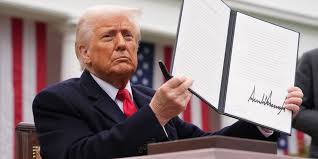US Faces $9.4bn Tourism Loss From New $250 Visa Fee Targeting African Countries
The United States’ decision to introduce a $250 “visa integrity fee” on international visitors has triggered sharp criticism from the global tourism industry, with officials warning that the measure could deter millions of travellers and cost the U.S. economy billions.
The $250 “visa integrity fee,” part of the One Big Beautiful Bill Act signed on July 4, 2025, will take effect later this year. According to immigration law firm Envoy Global, it applies to all nonimmigrant visa holders which include students, tourists, temporary workers, and business visitors particularly from African countries.
The fee is non-waivable, non-reducible, and charged on top of existing MRV, anti-fraud, and reciprocity fees.
The policy has drawn particular concern across Africa, where high travel costs, tariff barriers, and strict visa regimes already limit access to the American market.
For many middle-class travellers from Nigeria, Kenya, South Africa, and Ghana, an additional $250 charge could turn U.S. tourism into a privilege reserved for the ultra-wealthy.
According to the U.S. Travel Association, the fee is expected to reduce visitor spending by $9.4 billion and tax revenue by $1.3 billion over the next three years. The group also estimates that about 15,000 U.S. travel jobs could be lost as a result of fewer international arrivals.
Forbes reports that these projections stand in sharp contrast to calculations by the Congressional Budget Office (CBO), which expects the fee to generate $27 billion over ten years, roughly $2.7 billion annually, for the U.S. Treasury.
However, industry economists argue the CBO analysis focused only on revenue collection, excluding the wider economic fallout of reduced travel demand.
“By longstanding tradition, the Congressional Budget Office does not incorporate macroeconomic feedback effects into its traditional cost estimates,” a CBO spokesperson told Forbes. “We didn’t specifically do a dynamic analysis of this provision.”
Similarly, Tourism Economics, a division of Oxford Economics, estimates the $250 fee could discourage 5.4% of international visitors, almost one million trips annually. Fewer visitors mean reduced spending on hotels, restaurants, retail, and cultural attractions, which in turn lowers tax income and weakens job creation.
Erik Hansen, senior vice president of government relations at the U.S. Travel Association, said: “Congress made the mistake of assuming that this worldwide visa integrity fee would not have a big impact on visitors from countries like India or Brazil. This is the exact type of armchair public policymaking that is going to get us into a big mess.”
While Hansen highlighted India as a “bright spot” for inbound travel, with Indian tourists spending $13.3 billion in the U.S. in 2024, similar growth has been recorded across Africa.
Demand from students, entrepreneurs, and leisure travellers has been rising since the pandemic, with airlines such as Ethiopian Airlines, South African Airways, and Royal Air Maroc expanding U.S. bound capacity. However, a new supercharge from Washington could halt this trajectory.
For African students in particular, the cost comes on top of visa application charges, SEVIS fees, and proof-of-funds requirements.
Analysts warn that the fee risks slowing down people-to-people exchanges, business travel, and academic opportunities that have traditionally linked the U.S. and Africa. And could redirect African families to more accessible destinations such as Canada, the UK, and China.
Congress has described the fee as refundable once a visa expires, provided all conditions are met. But with most U.S. visitor visas valid for ten years, the refund process appears impractical.
“The idea that you’re going to give the government money and then wait around 10 years and remember to ask for it back, even if you followed the rules, is just absolutely crazy,” Hansen told Forbes.
The CBO itself acknowledged that only “a small number of people would seek reimbursement” and noted that the State Department would require years to create a refund system.
The timing of the new fee raises further questions about U.S. tourism competitiveness and openness, especially as the country prepares to host global sporting events like the Olympics and the FIFA World Cup.
A World Travel & Tourism Council (WTTC) report in June forecast that international visitor spending in the U.S. could fall by as much as $29 billion in 2025, the only major economy projected to see a decline.
“While other nations are rolling out the welcome mat, the U.S. government is putting up the ‘closed’ sign,” Julia Simpson, president and CEO of WTTC, said.
Unlike travellers from over 40 countries, including Japan, South Korea, most of Western Europe, and Australia, who enjoy visa-free entry to the U.S. under the Visa Waiver Program, no African country is included. This means African travellers, already burdened with strict visa requirements, will be disproportionately affected by the additional $250 fee.
Fewer Africans travelling to the U.S. could mean reduced cultural, academic, and professional exchanges, weakening U.S.–Africa ties at a time when China, Europe, and the Gulf states are aggressively courting African travellers.
The fee could also discourage family visits, cutting remittance-linked travel flows, and make it harder for African SMEs and startups to access U.S. markets.
As Hansen warned: “It will absolutely deter travel—that’s what our research has found.”








